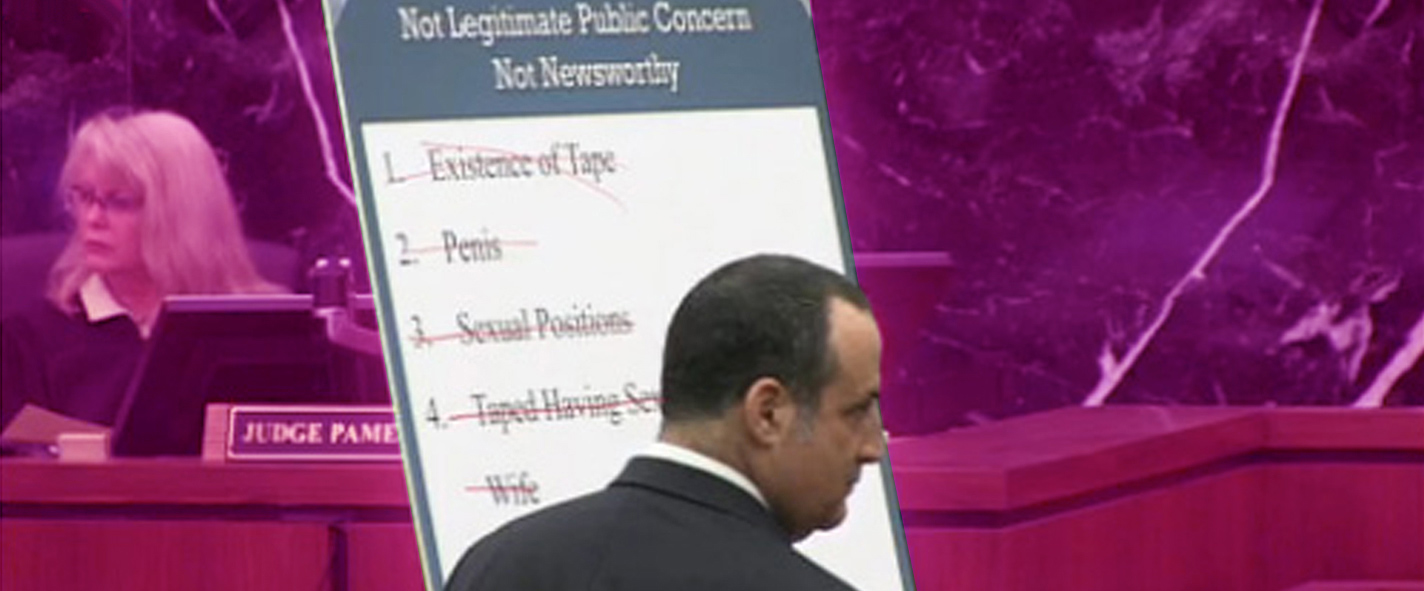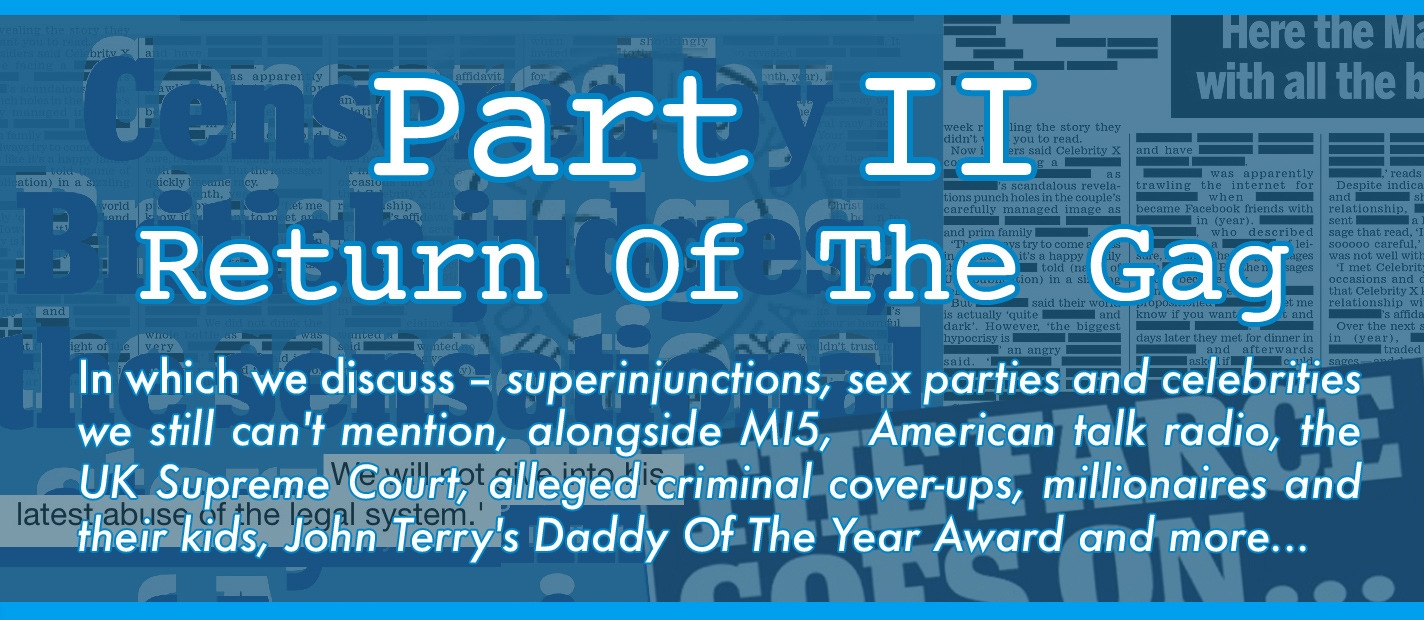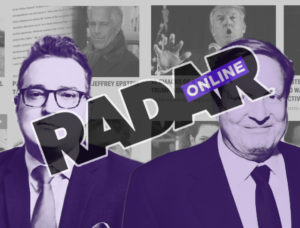Few expected Gawker to win its case against Hulk Hogan at the start of 2016 after they published clips from his sex tape, but nobody expected them to get obliterated. Gawker’s bankruptcy started a worrisome chain reaction for press freedom in the States – one which now goes right the way to the top…
Part I: The Newsworthy Penis

 It’s safe to say that when James Madison was drafting the First Amendment back in the late 18th Century he probably didn’t foresee a situation wherein an infamously snarky New York gossip blog would one day get its hands on an illicitly gained sex tape of a world-famous wrestler, publish footage of him actually engaged in the act of penetrating his former-best friend’s wife, accompany it with a 1,500 word written commentary of his sexual performance and then wrap themselves in the Constitution when said world-famous wrestler decides to sue every last inch of their arse for invading his privacy.
It’s safe to say that when James Madison was drafting the First Amendment back in the late 18th Century he probably didn’t foresee a situation wherein an infamously snarky New York gossip blog would one day get its hands on an illicitly gained sex tape of a world-famous wrestler, publish footage of him actually engaged in the act of penetrating his former-best friend’s wife, accompany it with a 1,500 word written commentary of his sexual performance and then wrap themselves in the Constitution when said world-famous wrestler decides to sue every last inch of their arse for invading his privacy.
If he had, he really should have thought to add in a line in about whether or not the press is required to take an active interest in the cocks and balls of its nation’s athletes, because it would have saved everyone a whole lot of bother in early 2016 when Hulk Hogan took Gawker to court for publishing snippets of his sex tape on their website.
But, hey. That’s nation building for you. Mistakes get made.
Plus, to blame James Madison for what happened (or any of the Founding Fathers, for that matter) is a touch unfair. Not least because there are a number of other perfectly viable candidates to shoulder the blame for the shitshow that unfolded in that case.
Manhattan’s media elite, the legal sharks of LA, Silicon Valley’s libertarian disrupters and the Regular Joes of St Petersburg, Florida all have their part to play in the case of Bollea v Gawker: a case which may yet have unexpectedly awful repercussions for the press and First Amendment rights.

Moneyballs
Here’s a few numbers for you.
When Pamela Anderson took up a lawsuit against IEG for leaking her sex tape with Tommy Lee to the internet, the judge awarded her $1.5m. The tape was 39 minutes long.
When Kim Kardashian took up a lawsuit against Vivid Entertainment for trying to distribute her leaked sex tape with Ray J, she settled out of court for a reported $5m. The tape was 41 minutes long.
When Hulk Hogan took up a lawsuit against Gawker for publishing his sex tape, he put in a claim for $100m. The case went to trial and the jury found in favour of Hogan – but they disagreed with the amount he was asking for.
They decided to award him $140m instead.
The tape that Gawker published was less than two minutes long.
That works out at more than $1m per second of footage. Given that the tape Gawker published only featured nine seconds of actual sexual activity, stroke-for-stroke it’s closer to $15m per second – but why is all this vulgar money talk important?
First, it’s important because Bollea v Gawker has exploded the boundaries for how much a celebrity can realistically claim when launching these sorts of lawsuits.
Damages in civil cases like this are usually determined by the examples set by judges and juries in similar circumstances. Historically, leaked sex tapes have earned other (predominantly female) celebrities relatively tiny seven-figure sums. Although Hogan eventually settled for an eight-figure sum, we’ve entered a new reality where a nine-figure sum has a precedent. So these cases have just become 100 times more expensive at a time when a great deal of journalism is struggling to make ends meet.
Second, and slightly more pressingly, it’s important because this judgement bankrupted Gawker. The unprecedented amount awarded to Hulk Hogan in restitution for the publication of his sex tape caused both Gawker itself and its owner, Nick Denton, to file for Chapter 11 bankruptcy protection.
The company was sold and its flagship blog, gawker.com, was shuttered. For good. That’s it. Gone.
Heaven knows there weren’t many sensible people defending Gawker’s decision to publish this tape (even fewer defending their decision to really dig their heels in and make Hulk Hogan’s erect penis a freedom of speech issue) but there is still something pretty sobering about the legal precedent that this all sets.
You see, this case wasn’t just about snippy Manhattanite media types wanting to have a chuckle about an ageing celebrity getting his dick wet. On paper maybe it was – but, in practice, there was a little more to it.
Had it just been a show-down between Hulk Hogan and Nick Denton, the whole thing could possibly have been contained. But there were two other players in this game. Two men who, with their determined approach to this particular case, have possibly changed the face of First Amendment interpretation for the foreseeable future.
The first of these men is the one who put the suit together and recommended the $100m claim: Hulk Hogan’s lead lawyer, Charles J Harder.

Harder Times
Charles Harder got his start in law working for a real legend of the celebrity set: Marty Singer. If you want to read up on the man they call “Mad Dog” – a lawyer who has worked minor miracles for the great and un-good of the celebrity world – he’s a pretty fascinating character and has had his extremely stern fingers in many, many pies.
Harder joined Singer’s firm, Lavely & Singer, to help celebrities with their image rights. Mainly this would mean getting their names scrubbed from knock-off merchandise. Sometimes it would mean getting photoshopped nudes of various starlets taken down off the net.
Occasionally he’d hit upon a case that was batshit sounding enough to get him a mention in a novelty newspaper story (a “Jude Law Slaps Canadian Fireplace Maker With Lawsuit”; a “Clint Eastwood Sues Furniture Company”) but – for the most part – that was it.
We’ve documented Harder’s rise from tradesman-botherer to media-scalper in further detail elsewhere but, essentially, it all boils down to this: having learned from one of the brashest, most bullish lawyers in the business, Charles Harder is now taking a Singer-esque pride in his position as the go-to guy for tearing down media organisations.
Permanently silencing bad press is a highly marketable skill to a certain sort of power-hungry egomaniac, so it’s no surprise that Harder has found himself on the call-lists of some pretty high-flyers.
The recently disgraced former president of Fox News and alleged seasoned sexual harasser, Roger Ailes, for example.
Proposed senior strategist for the Trump administration and posterboy for white nationalists, Steve Bannon, for another.
Melania Trump too has signed up Harder’s firm to represent her in a lawsuit she has filed against the Daily Mail. They repeated a suggestion that she had worked as an escort – a bit of slander that Harder reckons is worth $150 million to her.
Even if Harder had just taken this case for the exposure, it would have been more than worth his while. The contacts he’s amassed since will keep him in high-profile work fighting press freedom for the rest of his career.
But Harder did get get paid for his time. He got paid well. Not by Hulk Hogan – but by someone else.
That’s where the second man comes in. The man who secretly bankrolled the case, and encouraged Hulk Hogan to continue to press charges: Silicon Valley billionaire, Peter Thiel.

For Pete’s Sake
We’ve written plenty about Peter Thiel and his involvement in the upcoming apocalypse already, so we wont rehash too much of it here, except to say that Peter Thiel is a devious sneak – and is possibly the single greatest threat currently facing the free press.
Thiel is often described in profiles as “the PayPal billionaire”. And while it’s true that he co-founded PayPal and currently has a net worth of around $2.7 billion, the phrase “PayPal billionaire” doesn’t really give an accurate reflection of the whole story.
PayPal was sold to eBay in 2002 and Thiel’s stake in the company at that time was reported to have earned him $55 million. $55 million, if you don’t happen to have your calculator handy, is not quite a billion dollars. He did, however, make a billion dollars for being the first outside investor in Facebook, having bought a 10% stake for $500,000 in 2004 and then selling it on in 2012. (He remains on their board of directors.)
Also in 2004, Thiel managed to secure funding from the CIA to create a software company by the name of Palantir Technologies. Palantir specialises in big data analysis and counts among its clients the CIA, the NSA, the FBI and all manner of three-lettered government agencies. Palintir is currently valued at around $15 billion.
(You may also have heard his name mentioned in conjunction with Donald Trump. Thiel donated over a million dollars to Trump’s campaign, acted as a delegate for him in California and was invited to give a speech at the Republican National Convention in Cleveland – but we’ll deal with Trump later in Part Four)
So why, you may be thinking, would a man as busy and important as Peter Thiel take such an interest in Hulk Hogan’s exposed penis?
The answer is: he didn’t. Like most people, Peter Thiel wasn’t particularly interested in Hulk Hogan’s exposed penis. He wasn’t interested in it at all. What he was interested in was himself.
Years before this all took place, Gawker had run a story about Thiel in their former Silicon Valley vertical, Valleywag. The story outed him. In fact, the headline did. It was titled: Peter Thiel Is Totally Gay, People.
For what it’s worth, it was a broadly sympathetic look at Thiel. It didn’t give him a hard time about his involvement with Facebook and Mark Zuckerburg. It didn’t question Palantir’s CIA funding and how it arguably sat at odds with Thiel’s libertarian views. Instead, the thrust of the story was: Peter Thiel is gay, and it’s important to acknowledge that gay people can be successful.
Whether Gawker had any right to make this information public knowledge without Peter Thiel’s consent is a matter that will be discussed by press ethicists for many years to come. Not least because it was that, and not the publication of Hulk Hogan’s sex tape, that was the real reason that they ended up in court.
Thiel hit the fucking roof when that article came out. He vowed to rain down destruction on Gawker and Nick Denton but he knew he didn’t have a case to bankrupt them himself. So he lay in wait for nearly ten years to wreak his revenge, waiting for a potential proxy lawsuit to make itself apparent.
When he saw his chance in Hulk Hogan, he pounced. He funded Hogan’s legal fees on the quiet, secretly paying Charles Harder to take the case to trial in the hopes that he could silence Gawker for good. Which he did. What’s more, he did it for a modest $10m legal bill. For less than 0.5% of his total net worth Peter Thiel managed to shut down a successful media organisation worth many more times that.
It’s every bit as canny as it is alarming – but to give Thiel too much credit for this would be to fall into the trap that we have been repeatedly falling into in 2016. This explanation gives too much credence to the powerful elite and it ignores the voice of the common man.
For more important in this whole thing than Hogan, or Harder, or Thiel? The six men and women of the jury.
Six Appeal
When it was announced that Hogan was bringing a $100m lawsuit against Gawker, the media class scoffed at it. The general opinion was that Gawker may well lose the case (it was a fairly indefensible thing to do) but they would likely win on appeal. The First Amendment was a sacred right that all Americans hold dear, they said. It would defend them. They wouldn’t pay anything like the amount the damages they were on the hook for.
The media elite were wrong.
When Hulk Hogan’s case ended up on Charles Harder’s desk, Harder assessed the merits of the evidence and put a $100 million stamp on it. Whether he was chancing his arm, or whether he genuinely thought that was what the case was worth, he – and his team of experts – thought $100 million was a reasonable amount to shoot for.
The lawyers were wrong.
So what happened?
The jurors – made up of regular Floridian citizens – were horrified at what Gawker had done, and they didn’t mince their words in post-trial interviews.
Kevin Kennedy: “It’s just amazing, everything I listened to, that they [Gawker] have no heart. No soul. It’s all about the almighty dollar, and it’s sick.”
Shane O’Neil: “There’s absolutely no doubt that the decision we made was absolutely correct… It just wasn’t about punishment of these individuals and Gawker. You had to do it enough where it makes an example in society and other media organisations… and we had to take that into consideration.”
Shelby Adkins: “[Denton] has just got a different moral backbone than, I think, the typical person”
Robin Young: “We probably would have hit A.J. [Daulerio; the writer] harder, but we just didn’t think you could get blood out of a rock.”
But perhaps the most insightful quote of all came from juror Paula Eastman. She said, “If Hulk Hogan and his lawyers had asked them to take the post down and the verbage [sic], it would have been a First Amendment issue. We would have sided with Gawker, for sure, but it just wasn’t the case. They asked him to take the video down which was a privacy act. It was very clear to me.”
Paula is right. If Gakwer had treated it primarily as a privacy case and thought about it purely in those terms, they might have made better decisions. Instead, they saw Hogan’s privacy charge and – invoking the First Amendment – they raised the stakes. The made it about freedom of speech.
Consider a game of poker. If you’re down to your last dollar and you decide to throw in your car keys, you’d better be damn sure you have a good hand to play – because if you don’t, and you lose, those keys aren’t coming back to you anytime soon.
In refusing to take down the video and choosing instead to fight this case as a freedom of speech issue, Gawker went all in and threw the First Amendment into the pot – but they just didn’t have a good enough hand.
Which means that the First Amendment – for the moment, at least – is now in the hands of celebrities and their lawyers.
So it’s a good job America hasn’t just elected a singularly thin-skinned celebrity to the highest office in their land, isn’t it? What a blessed relief that a mad little radge, who has already threatened to sue a number of publications, isn’t going to be the man to nominate the next appointment to the Supreme Court. And there’s absolutely no cause for alarm in the fact that four of his closest advisors (including Peter Thiel) have all hired the services of the self-same lawyer… Charles J Harder, Esq.
Before anyone reading in the UK gets too smug about this though – thinking that we’d never be so foolish as to let something as frivolous and inconsequential as a celebrity’s sex life reshape the rules of our national discussion – you’ll never guess what we’ve gone and done….





